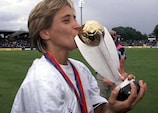2001: Müller magic seals success
sábado, 7 de julho de 2001
Sumário do artigo
Germany's third straight title came from a dramatic Claudia Müller winner in torrential rain against Sweden.
Conteúdo media do artigo

Corpo do artigo
Having been thwarted in their bid for a hat-trick of titles in 1993, Germany were finally able to win three UEFA European Women's Championships in a row when they triumphed on home soil. But they had to wait an extra two years to do it, as the tournament became a quadrennial competition, making room for the 1999 FIFA Women's World Cup at which Norway relinquished their crown by finishing fourth.
Again the tournament was played out in two divisions with Ukraine, Yugoslavia and Switzerland having been promoted since 1997 and Romania, Croatia and Slovakia relegated. Although only Ukraine of the upwardly mobile sides managed to avoid the wooden spoon in their group, some other nations challenged the established order.
In Group 1, France continued their improvement, defeating Sweden in Nimes to claim first place. Norway cruised past England and Portugal in Group 2 - and three months after their last qualifier took Olympic gold in Sydney. Germany topped Italy in Group 3 while Russia won all of their six Group 4 matches; no mean achievement in a pool containing Denmark and Finland.
This time around the play-offs produced a clean sweep for the runners-up against the third-placed teams. Denmark beat Spain 6-1 away and 4-2 at home; Sweden also produced a 10-3 aggregate triumph versus Finland; England overcame Ukraine 4-1 overall to become the only non-qualifiers from 1997 to reach the last eight; and a 3-0 home victory against Portugal allowed Italy to afford a 1-0 loss in Portalegre.
In 1989 and 1995, Germany had been crowned European champions on home soil, and after another six-year interval repeated the trick. The first goal of the final round went against the hosts, scored 14 minutes in by Sweden's Hanna Ljungberg, but in front of more than 10,000 fans Germany hit back with two goals from Claudia Müller and a late Maren Meinert effort. Germany and Sweden defeated Russia and England in their remaining games to reach the last four, and their rivalry was not over.
In Group B, Norway sailed to a 3-0 success against France while Italy edged past Denmark 2-1 in the openers. France were then eliminated, a last-gasp Gitte Krogh strike giving Denmark a 4-3 win after the French had Corinne Diacre sent off, while Italy and Norway drew 1-1. Italy seemed on course, but a French team now playing for pride found form, and won 2-0. Italy would still have progressed if Norway had beaten Denmark, but the Danes prevailed 1-0, leaving the Azzurre out on goal difference.
Neither Norway nor Denmark were to survive the semi-finals, however. In front of another large crowd in Ulm, Germany saw off Norway with a Sandra Smisek goal on 57 minutes, and later at the same venue Tina Nordlund's early strike helped Sweden past Denmark for a rematch of the 1995 final, won 3-2 by Germany.
The 18,000 spectators in Ulm for the decider were rewarded with a dramatic encounter. In torrential rain, a German side containing nine of the players that started the 1997 final with Italy began strongly, but neither team could break through in the 90 minutes.
A golden goal - the only one the competition would see - could now settle matters, and eight minutes into extra time Müller's composed finish ensured a fifth European title for Germany. Ironically, Sweden were to fall to the same opposition by a 1-0 scoreline in the 2003 World Cup final and 2004 Olympic bronze-medal match.

